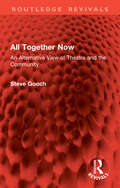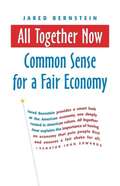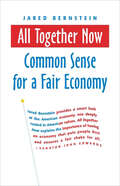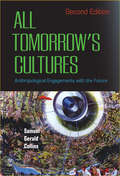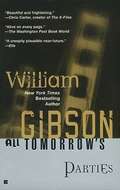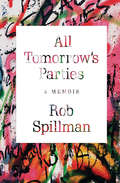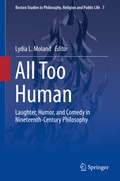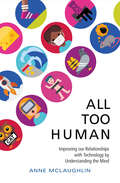- Table View
- List View
All Together Now: A Novel
by Gill HornbyThe Bridgeford Community Choir is in crisis. Numbers are down. The choir leader is in hospital. The tea urn is behaving in an ominous fashion. Something must be done. New joiners Tracey Leckford and Bennett Parker might just be able to save the day. But Tracey is hiding a huge secret about her past. And Bennett - while equipped with a beautiful singing voice - is entirely baffled by the world and everything in it. Can they really fit in with dependable old regulars like Annie? As the choir suffers through fights, feuds and the perils of the school fair, it becomes clear that their struggles are not just about music, but the future of their community. In order to save their singing group and their town, the Bridgeford Singers will have to find a way to work together - in harmony.
All Together Now: A Novel
by Matthew NormanA dying man brings his oldest friends together for one last beach blowout in this witty, heartfelt novel from the author of Last Couple Standing.&“Fast, fun, and wise—the perfect summer read.&”—Nancy Thayer, New York Times bestselling author of Family ReunionAt just thirty-five, reclusive billionaire Robbie Malcolm is a renowned financial prognosticator, a celebrated philanthropist, and a mathematical genius. Also, he&’s dying, which is a fact he&’s carefully concealing from the world. As he takes stock, Robbie realizes that his wealth means nothing if he can&’t help the people who matter most. So he invites his oldest friends—Blair, Cat, and Wade—to their beloved Fenwick Island on the coast of Delaware to share his secret and to reveal plans for each of them that he believes will change their lives forever. However, Robbie isn&’t the only one with secrets. The bonds the friends formed as teenagers still exist, but adulthood has brought a whole new set of complications, like unrequited loves, marriages on the brink, and so much unfulfilled potential. Robbie&’s plans may look good on paper, but are they any match for the utter disaster that is real life? As everything comes to light over a wild weekend full of surprises, Robbie learns there are still some things money can&’t buy, and a group of friends who thought their best years were behind them realize just how much they have to look forward to.
All Together Now: American Holiday Symbolism Among Children and Adults (Rutgers Series in Childhood Studies)
by Cindy Dell ClarkIn a hard driving society like the United States, holidays are islands of softness. Holidays are times for creating memories and for celebrating cultural values, emotions, and social ties. All Together Now considers holidays that are celebrated by American families: Easter, Memorial Day, Independence Day, Halloween, and the December holidays of Christmas or Chanukah. This book shows how entire families bond at holidays, in ways that allow both children and adults to be influential within their shared interaction. The decorations, songs, special ways of dressing, and rituals carry deep significance that is viscerally felt by even young tots. Ritual has the capacity to condense a plethora of meaning into a unified metaphor such as a Christmas tree, a menorah, or the American flag. These symbols allow children and adults to co-opt the meaning of symbols in flexible and age-relevant ways, all while the symbols are still treasured and shared in common.
All Together Now: An Alternative View of Theatre and the Community (Routledge Revivals)
by Steve GoochIn All Together Now (first published in 1984), Steve Gooch, himself a playwright with extensive experience of ‘community theatre’, looks at the relationship of the theatre to the community in which it takes place. Taking the work of contemporary ‘community theatre’ as a stimulus, he gives a ‘behind-the-scenes’ analysis of the failure of commercial theatre—in the subsidised sector as well as the West End—to transcend the mechanisms of box-office and tradition, and to play a vital and integral part in the life of its audience. Examining the initiatives of small theatres and touring companies in the seventies, Gooch looks critically at their work practices and forms of organisation and draws some positive pointers for the future.As much about the internal workings of theatre production as about the content and outward face of its shows, All Together Now offers new insights into a culture divided between ‘high and low’, ‘popular and serious’.
All Together Now: Common Sense for a Fair Economy
by Jared BernsteinEconomist Jared Bernstein believes that frames such as "the ownership society" stress an ever-shrinking role for government and an ever-increasing risk for individuals, clearly implying "You're on your own."
All Together Now: Common Sense for a Fair Economy (Bk Currents Ser.)
by Jared BernsteinAs the new century unfolds, we face a host of economic and social challenges--jobs lost to "off shoring," a huge and growing number of Americans without health insurance coverage, an expanding gap between rich and poor, stagnant wages, decaying public schools, and many others. These are difficult and complex problems, but our government's strategy for dealing with them has been essentially not to deal with them at all. Over and over, in subtle and not-so-subtle ways, we're told that we're on our own--"Here's a tax cut and a private account; now go fend for yourself." As Jared Bernstein points out, this approach doesn't make any sense as a strategy for solving the enormous systemic problems we face. It's just a way of shifting economic risk from those most able to bear it--the government and the nation's corporations--to those least able: individuals and families. The result has been greater wealth for the top 1% of Americans and stagnant living standards and increasing insecurity for the vast majority. In All Together Now, Bernstein outlines a new strategy, one that applauds individual initiative but recognizes that the problems we face as a nation can be solved only if we take a more collaborative approach. The message is simple: we're all in this together. Bernstein draws on recent and historic events to explore how the proponents of what he dubs the YOYO (you're-on-your-own) approach have sold the idea, exposing the fallacies and ulterior motives in their arguments as well as the disasterous consequences of their policies. More importantly, he details practical WITT (we're-in-this-together) initiatives in specific areas like globalization, health care, and employment that could improve the lives of millions of Americans without increasing overall national spending. And he offers advice on how to overcome objections to the WITT agenda and bring the country together so that both risks and benefits are shared more fairly. While the prevailing philosophy insists that all we can do is cope with massive social forces, each of us on our own, Bernstein argues that we can unite and shape these forces to meet our needs. The optimistic message of All Together Now is that the economic challenges we face are not insoluble; we can wield the tools of government to meet them in such a way as to build a more just and equitable society.
All Together Now: From the million-copy bestselling author
by Monica McInerneyShortlisted for General Fiction Book of the Year in the 2009 Australian Book Industry Awards. A group of friends on an unconventional diet learn some important life lessons, a fashion-challenged grandmother weaves some magic in a dusty charity shop, a grieving young mother takes a healing journey, and a shy woman from a family of high achievers learns to follow her dreams.All Together Now is a collection of McInerney’s short fiction gathered between two covers for the first time. Including several of her earliest magazine short stories, contributions to recent anthologies, her warm and witty novella Odd One Out, and two new stories, this is a book to inspire and delight fans of all ages.Praise for Monica McInerney:'Monica McInerney is at the very top of her game . . . If you've yet to read her books, treat yourselves IMMEDIATELY!' Patricia Scanlan, bestselling author of A Time For Friends'You'll be laughing out loud one minute and crying the next' Cosmopolitan'Heart-warming . . . A lovely read' Hello! Magazine'McInerney is a must-read author for women's fiction fans around the world' Huffington Post'McInerney's bewitching multigenerational saga lavishly and lovingly explores the resiliency and fragility of family bonds' Booklist
All Together Now: How to Engage Your Stakeholders in Reimagining School
by Suzie K. BossA framework for leading change Education is evolving rapidly. To sustain change, school communities need broad support for shifts in teaching and learning that promise better outcomes for learners. This requires collaborative inquiry and hard conversations involving everyone with a stake in student success. Designed to promote and provoke conversations inside and outside schools, All Together Now will inspire educators and fellow stakeholders to embark on the challenging work ahead. Readers will find a clear, four-part framework that will help them navigate the journey by understanding • Why they should build common understanding about change • How to move from vision to reality • The What-ifs of trouble shooting strategies • The power of The Future Story to move forward with optimism
All Together Now: How to Engage Your Stakeholders in Reimagining School
by Suzie K. BossA framework for leading change Education is evolving rapidly. To sustain change, school communities need broad support for shifts in teaching and learning that promise better outcomes for learners. This requires collaborative inquiry and hard conversations involving everyone with a stake in student success. Designed to promote and provoke conversations inside and outside schools, All Together Now will inspire educators and fellow stakeholders to embark on the challenging work ahead. Readers will find a clear, four-part framework that will help them navigate the journey by understanding • Why they should build common understanding about change • How to move from vision to reality • The What-ifs of trouble shooting strategies • The power of The Future Story to move forward with optimism
All Together Now: The co-working and co-living revolution
by Naomi Cleaver Amy FrearsonCollaborative spaces have been hailed as either the solution to the 21st century’s culture of overwork and broken housing market, or as an unworkable and impractical aspiration. Designing for such spaces has its particular challenges and considerations, especially in how to deliver attractive, healthy and efficient collaborative places. A practical and inspirational design guide, this book draws on the author's own experience, as well as the work of others, offering workable and practical solutions, and showcases a huge variety of different kinds of collaborative spaces across the globe. Including detailed and illustrated case studies across the co-living, co-working typologies – both new build and conversion, at different scales and in different settings – it concludes with a best practice toolkit, giving practical advice and lessons for all designers working at any scale. Case studies include: *The Project, Hoxton, London *Outpost, Bali *Venn, Tel Aviv
All Together Now: Vision, Leadership, and Wellness
by Gail VoisinAchieving outstanding personal and organizational success in our busy, competitive, chaotic — yet very exciting — world requires a unique, leading-edge set of skills for 21st-century executives and leaders. It is critical for them to have the knowledge and ability to align the three key areas of Vision, Leadership and Wellness to measure and sustain high performance levels — the All Together Now Advantage™. When they do, not only will they be in great demand in corporations, but they will be able to live their dream now. In All Together Now, world-class Executive Coach Gail Voisin demonstrates the importance of:Finding your personal vision and linking it to your organization’s vision.Getting and staying laser-focused on areas of leadership that matter most to your personal and business success - accomplishing more while at the same time expending less energy.Staying physically and mentally healthy to enhance the overall quality of your life.
All Together in One Place (Kinship and Courage #1)
by Jane KirkpatrickOne of the incidents that made a profound impression upon the minds of all: the meeting of eleven wagons returning and not a man left in the entire train; all had died, and been buried on the way, and the women returning alone. --from the journals of Ezra Meeker, 1852. THEIR LIVES WOULD BE TEMPERED BY ADVERSITY, EXPANDED BY FAITH, POLISHED BY PERSEVERANCE--For Madison "Mazy" Bacon, a young wife living in southern Wisconsin, the future appears every bit as promising as it is reassuringly predictable. A loving marriage, a well-organized home, the pleasure of planting an early spring garden--these are the carefully-tended dreams that sustain her heart and nourish her soul.But when her husband of two years sells the homestead and informs her that they are heading west, Mazy's life is ripped down the middle like a poorly mended sheet forgotten in a midwestern storm. Her love is tried, her boundaries stretched, and the fabric of her faith tested. At the same time, she and eleven extraordinary women are pulled toward an uncertain destiny--one that binds them together through reluctance and longing and into acceptance and renewal. Based on an actual 1852 Oregon Trail incident, All Together in One Place, Book One in the Kinship and Courage series, speaks to the strength in every woman and celebrates the promise of hope that unfailingly blooms amidst tragedy and challenge.
All Told: My Art and Life Among Athletes, Playboys, Bunnies, and Provocateurs
by Leroy NeimanLeRoy Neiman was arguably the world&’s most recognizable contemporary artist until his passing in June 2012. He broke the barrier between fine art and popular art while creating indelible images that helped define the twentieth century. But it is the life he lived and the people he knew that make the memoir of this scrappy Depression-era kid who became a swashbuckling bon vivant with the famous mustache such a marvelous historical canvas. Chronicler and confidant of Muhammad Ali, Neiman also traveled with Sinatra, cavorted with Dalí and Warhol, watched afternoon soaps with Dizzy Gillespie, played in Sly Stallone&’s Rocky movies, exchanged quips with Nixon, smoked cigars with Castro, and experienced the terrorist attacks at the Munich Olympics alongside Peter Jennings, Howard Cosell, and Jim McKay. And then there was his half-century relationship with Hugh Hefner as principle artistic contributor to Playboy, setting up studios in London and Paris to cover his Playboy beat, &“Man at His Leisure,&” and his creation of the Femlin, the iconic Playboy nymphette. With his life&’s work, and in All Told, LeRoy Neiman captured sports heroes, movie stars, presidents, dishwashers, jet-setters, jockeys, and more than a few Bunnies at the Playboy Mansion—a panoramic record of society like no other.
All Tomorrow's Cultures: Anthropological Engagements with the Future
by Samuel Gerald CollinsThe first edition of All Tomorrow’s Cultures explored the legacy of futures-thinking in anthropology and marked the beginning of a resurgence of interest in anthropological futures. The new edition has been updated to reflect some of the outpouring of work since then, particularly in science and technology studies and in anthropological analyses of indigenous futures. In addition, Collins has updated the final chapter to expand the field of anthropological possibility in an age of both despair and hope.
All Tomorrow's Parties (Bridge Trilogy)
by William GibsonThe flow of information is about to be disrupted...<P> Colin Laney, sensitive to patterns of information like no one else on earth, currently resides in a cardboard box in Tokyo. His body shakes with fever dreams, but his mind roams free as always, and he knows something is about to happen. Not in Tokyo; he will not see this thing himself. Something is about to happen in San Francisco...<P> The mists of San Francisco make it easy to hide, if hiding is what you want, and even at the best of times reality there seems to shift. A gray man moves elegantly through the mists, leaving bodies in his wake, so that a tide of absences alerts Laney to his presence. A boy named Silencio does not speak, but flies through webs of cyber-information in search of the one object that has seized his imagination. And Rei Toi, the Japanese Idoru, continues her study of all things human. She herself is not human, not quite, but she's working on it. And in the mists of San Francisco, at this rare moment in history, who is to say what is or is not impossible...
All Tomorrow's Parties: A Memoir
by Rob Spillman&“In this carefully wrought coming-of-age memoir, a young American writer searches for home in an unlikely place: East Berlin immediately after the fall of the wall.&” —Publishers Weekly, starred review Rob Spillman—the award-winning, charismatic cofounding editor of the legendary Tin House magazine—has devoted his life to the rebellious pursuit of artistic authenticity. Born in Germany to two driven musicians, his childhood was spent among the West Berlin cognoscenti, in a city two hundred miles behind the Iron Curtain. There, the Berlin Wall stood as a stark reminder of the split between East and West, between suppressed dreams and freedom of expression. After an unsettled youth moving between divorced parents in disparate cities, Spillman would eventually find his way into the literary world of New York City, only to abandon it to return to Berlin just months after the Wall came down. Twenty-five and newly married, Spillman and his wife, the writer Elissa Schappell, moved to the anarchic streets of East Berlin in search of the bohemian lifestyle of their idols. But Spillman soon discovered he was chasing the one thing that had always eluded him: a place, or person, to call home. In his intimate, entertaining, and heartfelt memoir, Spillman narrates a colorful, music-filled coming-of-age portrait of an artist&’s life that is also a cultural exploration of a shifting Berlin. &“With wry humor and wonder, Spillman beautifully captures the deadpan hedonism of the East Berliners and the city&’s sense of infinite possibility.&” —The New York Times Book Review &“A thrilling portrait of the artist as intrepid young adventure seeker.&” —Vanity Fair &“Convivial, page-turning . . . Spillman&’s life is a good one to read.&” —The Washington Post
All Too Human
by George Stephanopoulos George Pulos Stephen O. PulosA Rhodes scholar with a healthy ego, the young idealist George Stephanopoulos thought he was ready for the obscure governor of Arkansas. But soon after he signed on as his presidential-campaign manager, the odds of Clinton's triumph soared, and so did the chance for calamity via Gennifer Flowers and other scandals. Stephanopoulos scrambled behind the scenes, squelching rumors, spinning major news organizations, artfully knifing Clinton rivals, and second-guessing public opinion--lessons that would serve him well when Clinton won. For the next four years, Stephanopoulos was a few feet from the president, advising him on everything from Iraq and Waco to gays in the military and Paula Jones. More than any book yet--including Monica Lewinsky's--Stephanopoulos's memoir reveals what went on in the scary, occasionally hilarious world backstage at the White House. He casts stark light on characters from Yeltsin, "like a boiled potato slathered in sour cream," to the author's nemesis Dick Morris, whom he depicts bellowing for Clinton to bomb Bosnia. And nobody who's talking knows as well as Stephanopoulos the most passionate, mystifying affair of all, between Bill and Hillary. But years of backroom scheming, screaming, and relentless political attacks took a toll. Stephanopoulos's face erupted in hives; he grew a beard. Slammed by clinical depression, he dangerously delayed medical attention, fearing the story might leak. This memoir could've been titled Prisoner of Spin. Written with the jittery cadence of a bookie, All Too Human is a lively look at the complex and motley cast of characters who rule the world. --Rebekah Warren
All Too Human: A Political Education
by George StephanopoulosAll Too Human is a new-generation political memoir, written from the refreshing perspective of one who got his hands on the levers of awesome power at an early age. At thirty, the author was at Bill Clinton's side during the presidential campaign of 1992, & for the next five years he was rarely more than a step away from the president & his other advisers at every important moment of the first term. What Liar's Poker did to Wall Street, this book will do to politics. It is an irreverent & intimate portrait of how the nation's weighty business is conducted by people whose egos & idiosyncrasies are no sturdier than anyone else's. Including sharp portraits of the Clintons, Al Gore, Dick Morris, Colin Powell, & scores of others, as well as candid & revelatory accounts of the famous debacles & triumphs of an administration that constantly went over the top, All Too Human is, like its author, a brilliant combination of pragmatic insight & idealism. It is destined to be the most important & enduring book to come out of the Clinton administration.
All Too Human: Laughter, Humor, and Comedy in Nineteenth-Century Philosophy (Boston Studies in Philosophy, Religion and Public Life #7)
by Lydia L. MolandThis book offers an analysis of humor, comedy, and laughter as philosophical topics in the 19th Century. It traces the introduction of humor as a new aesthetic category inspired by Laurence Sterne’s "Tristram Shandy" and shows Sterne’s deep influence on German aesthetic theorists of this period. Through differentiating humor from comedy, the book suggests important distinctions within the aesthetic philosophies of G.W.F. Hegel, Karl Solger, and Jean Paul Richter. The book links Kant’s underdeveloped incongruity theory of laughter to Schopenhauer’s more complete account and identifies humor’s place in the pessimistic philosophy of Julius Bahnsen. It considers how caricature functioned at the intersection of politics, aesthetics, and ethics in Karl Rosenkranz’s work, and how Kierkegaard and Nietzsche made humor central not only to their philosophical content but also to its style. The book concludes with an explication of French philosopher Henri Bergson’s claim that laughter is a response to mechanical inelasticity.
All Too Human: Understanding and Improving our Relationships with Technology
by Anne McLaughlinWhy do people fear air travel, but text while driving? How were the travesties at the Abu Ghraib prison like a nuclear meltdown? What is the best way to throw a rocket at a robot? These are just a few questions addressed by the field of human factors psychology. These scientists use knowledge of how people think and why they act to improve the design of our world. In All Too Human, Dr. Anne McLaughlin introduces the field with vivid and topical stories that hinge on cognitive processes such as attention, memory, and decision-making. From the COVID-19 pandemic, to abandoned SCUBA divers, conspiracy theories, and the travails of online dating, McLaughlin draws on a century of research into the human mind to explain our past and predict our future.
All True Not a Lie in It
by Alix HawleyA New Face of Fiction for 2015, All True Not a Lie in It is pioneer Daniel Boone's life, told in his voice--a tall tale like no other, startling, funny, poignant, romantic and brawling, set during the American Revolutionary War and hinging on Boone's capture by the Shawnee. Here is Daniel Boone as you've never seen him. Debut novelist Alix Hawley presents Boone's life, from his childhood in a Quaker colony, through 2 stints captured by Indians as he attempted to settle Kentucky, the death of 1 son at the hands of the same Indians, and the rescue of 1 daughter. The prose rivals Hilary Mantel's and Peter Carey's, conveying that sense of being inside the head of a storied historical figure about which much nonsense is spoken while also feeling completely contemporary. Boone was a fabulous hunter and explorer, and a "white Indian," perhaps happiest when he found a place as the captive, adopted son of a chief who was trying to prevent the white settlement of Kentucky. Hawley takes us intimately into the life-and-death survival of people pushing away from security and into Indian lands, despite sense and treaties, just before and into the War of Independence. The love story between Boone and his wife, Rebecca, is rich and tangled, but mostly it's Boone who fascinates, pushing into places where he imagines he can create a new "clean" world, only to find death and trouble and complication. He is a fabulous character, unrivalled in North American literature, and a prime candidate for the tall tale. The storytelling is taut and expert, the descriptions rich and powerful, the prose full of feeling, but Boone is what drives this outstanding debut.
All True Not a Lie in It: A Novel
by Alix HawleyThe story of pioneer Daniel Boone's life, told in his voice--a tall tale like no other, startling, funny, poignant, romantic and brawling--set during the American Revolutionary WarHere is Daniel Boone as you've never seen him: debut novelist Alix Hawley presents Boone's life, from his childhood in a Quaker colony, through two stints captured by Indians as he attempted to settle Kentucky, the death of a son at the hands of the same Indians and the rescue of a daughter. The prose rivals Hilary Mantel's and Peter Carey's, conveying that sense of being inside the head of a storied historical figure about which much nonsense is spoken while also feeling completely contemporary.Boone was a fabulous hunter and explorer, and a "white Indian," perhaps happiest when he found a place as the captive, adopted son of a chief who was trying to prevent the white settlement of Kentucky. Hawley takes us intimately into the life-and-death survival of people pushing away from security and into Indian lands, despite sense and treaties, just before and into the War of Independence. The love story between Boone and his wife, Rebecca, is rich and tangled, but mostly it's Boone who fascinates, pushing into places where he imagines he can create a new "clean" world, only to find death and trouble and complication. He is a fabulous character, unrivaled in North American literature, and a prime candidate for the tall tale. The storytelling is taut and expert, the descriptions rich and powerful, the prose full of feeling, but Boone is what drives this outstanding debut.
All Tucked In . . .
by Jule McBrideCoffee shop owner Carla DiDolche is tossing and turning, but it isn't the java keeping her up at nights. A short stay at the sleep clinic belonging to ex-love Tobias Free could be the answer. Until Carla starts having erotic dreams about sizzling sex with Tobias...images that seem so real!Tobias would love to cure Carla's insomnia with dream therapy. But it's pure torture tucking her in...watching over her at night. Every moan, every quiver has him fantasizing about their heated past. He's so tempted to slip between the sheets. But can he put their tangled history aside and turn her nightmares into tantalizing dreams?



